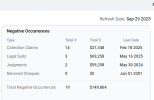The reality in our industry is that most are operational minded people who can drive a truck, get it from here to there, get it fixed, and then turned business owner. They bought a Load Link subscription, a decal for their truck and called on a Transportation Consultant to get a CVOR and an MC number. Boom they're a trucking company.
Unfortunately, they are not finance minded individuals who understand business. Balance sheets, cash flow and income statements mean nothing because somehow they have lots more money in the bank than the bottom line says it has - accountants must be idiots and what is amortization anyway?!. They buy a property, which goes up in value thinking they are the king of the hill but do not realize that their trucks and trailers have gotten older and require tons more maintenance.
Now the bank, who often redefine the term finance, says that your 'Quick ratio led us to look at your Fixed Charge Coverage which exceeds our prescribed limits noted on page XXXX of the agreement you signed' and the trucker turned company owner goes 'huh?'. Next call goes to his accountant, who he previously called an idiot, who advises him that it was a note on the previous year financial package (which he didn't read). The guy now scratches his head wondering what does this all mean? He has a property worth millions, how can that be a problem?
The problem is not what you own but the method on how you're going to pay back what you owe and keep it going over the life of the loan. If your sales drops, if your expenses rise, assets decrease, ratios go off side. The reality is that the bank sees the problem way before the trucker turned trucking company owner does. They have actuaries and economists who have identified the industries that need to be scoped. The bank probably wiggled the KPI's tighter at the last renewal just because the economists put trucking at the top of the sh*t list. The KPI's are in there to watch and catch improprieties in the books. In the case of Panjaab Transport, RBC saw a significant decrease in the deposits going into the bank account which was all it needed to sound the alarm and get someone on it.


